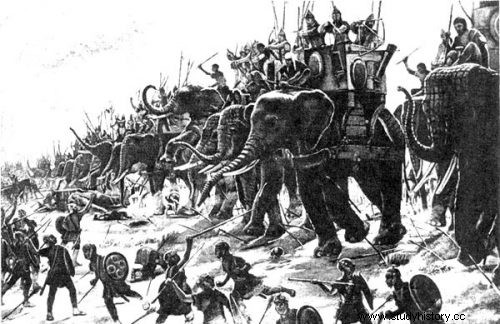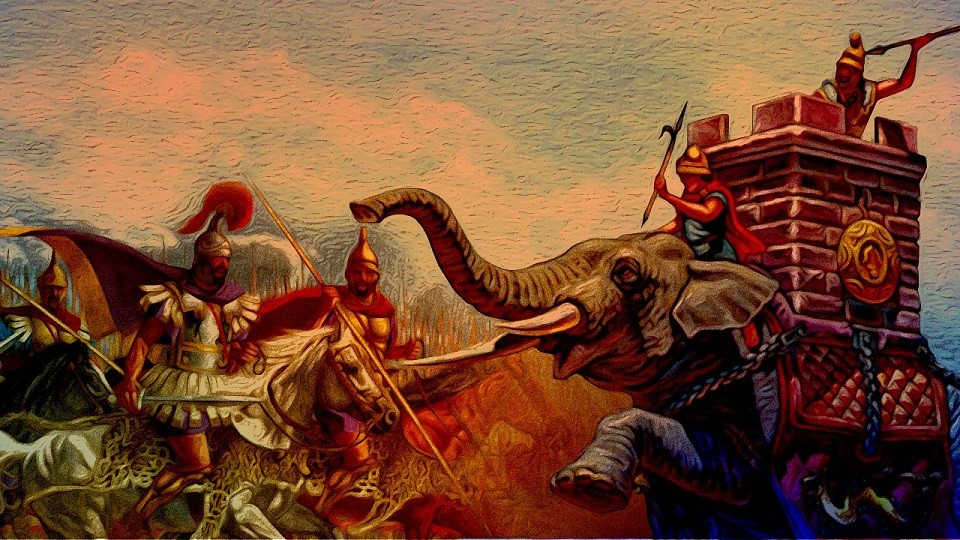Maharaj Paurav and Sikandar
Between the Jhelum and Chenab rivers was the kingdom of Puru. Puru was defeated in the encounter with Alexander, but Alexander returned his kingdom to him - Ancient History of India, Jha and Shrimali, page 171
During the preparation of civil service, unfortunately, we have to read this standard history written by leftist historians like Jha and Shrimali again and again, who, for their valor and valor, the history of the great king Puru, praising Alexander the Great, was reduced to just these two sentences. Is. Every time I read this history, I would be compelled to break my pencil or pen near these two sentences and get angry because every time I read the history book on Alexander by Oxford University historian Robin Lane Fox based on "Alexander the Great" I would have remembered Oliver Stone's film "Alexander" made in 2004, in which, in contrast to these leftist historians, it was shown that Alexander's army was defeated by the valor of Puru army and the terror of his Gaj army and when in anger, Alexander himself duel with Puru. When Puru's son put an end to his horse, Puru's arrow went straight into his stomach and he fell to the ground and became unconscious. The Greek soldiers somehow took him away from the battlefield and ran away. Alexander recovered but was very weak and in the same condition he was forced to return.
On the other hand, Sohrab Modi's film "Sikander", made in the 1950s, has also portrayed the incident of war in a similar way, but it gives a turning point to become a victim of these leftists. In Sohrab Modi's film, when Maharaj Puru starts hitting the bar with a spear after Sikandar's horse is hit by an arrow and it falls to the ground, he remembers the promise given to Sikandar's Iranian girlfriend who was frightened by the heroism of Maharaj Puru. She had come to Puru begging for her life and Puru had promised her that he would not kill Alexander. At that time, after escaping from the war, Alexander attacks Puru's sleeping soldiers in the night and takes Puru captive.
The question is, why does the leftist historian of India declare Alexander the great and Maharaj Puru defeated? Late Purushottam Nagesh Oak, the great researcher on history, says that "this gruesome history of untruth has penetrated into Indian history because all the descriptions of that great struggle we have got are all done by Greek historians".
He further writes, it is said that Alexander crossed the Jhelum river with his army in a thick dark night by boats and attacked Puru's army. It was raining that day and the giant elephants of Porus got stuck in the swamp. But if we analyze these descriptions of the Greeks properly, then it will be clear that the Gaj army of Porus had created a catastrophe in the enemy camp and destroyed Alexander's powerful army.

Arion writes that the Indian crown prince wounded Alexander and killed his horse, Book Fels.
Justin writes that as soon as the war started, Porus ordered the destruction.
Curtius writes that Alexander's army was stationed on an island on the Jhelum river. Puru's army swam across the river and attacked the front line of Alexander's army. He killed many Greek soldiers. Many Greeks jumped into the river to avoid death, but they all drowned in it.
Curtius Porus, further describing the horror of the elephants of the army on the Greek army, writes, “These animals had caused great terror, and their sparks not only frightened the horses, causing them to run away in a bad mood, but also the hearts of the cavalrymen. Give a fright They created such a stampede that these heads of many victories were now searching for a place where they could find shelter, now Alexander ordered an attack on the elephants in small pieces, so that the hurt animals got angry, attacked the invaders fiercely. , trampled them under their feet, grabbed them by the trunk and threw them in the air, threw them to their soldiers and the soldiers would immediately cut off their heads."

Diodorus has also described Puru's Hasti army in the same way, writing, "There was immense strength in the giant elephants. He crushed the bones and ribs of many Greek soldiers under his feet. Elephants used to grab these soldiers with their trunks and slam them hard in the ground. They used to kill soldiers by adopting them with their formidable gaj teeth."
Oliver Stone has depicted these events closely in his film. All this description clearly shows that the war was fought either on dry land or that the wetness of the land had no effect and that the Greeks falsified about the battle of Hydepsis (Jhelum) only to soothe their loss. spread.
Mr. E. A. Dwlu Benz, who edited the Ethiopian epics, has included a description of Alexander's life and his conquests in his work. He says, “Most of Alexander's horse army was killed in the battle of Jhelum. Alexander had realized that if I continued to fight, I would completely destroy myself. So he prayed to Porus to stop the war. According to the Indian tradition, Porus did not kill the surrendered enemy. After this both of them signed a treaty. In taking other territories under his empire, then, Porus was assisted by Alexander."
Mr. Benz has further given the details of Alexander's letter. He wrote that Alexander had requested Porus while praying for peace – “Mr Porus! I'm sorry. I have crowned your valor and power. Now I will not be able to bear these sufferings any more. With a sad heart, I have now intended to end my life. I do not want my soldiers to destroy my own belongings. I am the criminal who has pushed these soldiers into the cheeks of the Karal period. It does not suit a king to push his soldiers to death like this."
I see the truth in Mr. Benz's words. How can an imperial conqueror, after tireless efforts and irreparable loss, give to the conquered king his kingdom as well as other territories he conquered so that he becomes more powerful? Apart from this, I have not seen any other quote in history, but the leftist historians of English slavery compel us to believe the same thing of the Greeks that Alexander defeated Puru, then returned his kingdom by showing generosity and returned his conquered kingdom. Gave him a share too.
The reality was that the defeated Alexander had to help him conquer Porus' enemy kingdoms or smaller kingdoms according to the terms of the conquered Porus and also had to pay some part of the previously conquered states as compensation. The same fact that Porus had won something rather than losing his territory to Alexander shows that the real winner was Maharaj Puru, not Alexander, and Alexander had to make a treaty by giving his conquered territory. The history that is taught to us is only the propaganda of leftist historians. This written fact that Abhisar later refused to meet Alexander is a sign of Alexander's defeat. If Alexander had been the winner, the neutral convergence would never have dared to disregard him.
Historian Purushottam Nagesh Oak writes, "In the middle part of the Ravi and Vyas rivers, Alexander's armies had to fight many formidable battles. In ancient times Indians were so cautious and careful that they did not tolerate any kind of armed encroachment. Every citizen was a soldier. Therefore, reaching the banks of Vyas, Alexander's soldiers refused to fight any further battles because they faced severe arms resistance, they had to starve. They were hurt and tired of war."
He goes on to say, “Maharaj Porus, as a strategy, had allowed him to return through his kingdom through the routes of Sindh and Makran, and not to conquer and plunder small kingdoms as claimed by Greek historians. Alexander's army, dying of hunger and thirst, was advancing by attacking small states and cities for food and drink. Alexander's army was dying of hunger and thirst. In the meantime, the Indian tribes called Malawi fought hard against Alexander's army, which saved Alexander from going to death.”
Plutarch, while describing the war with the Malawi tribes, wrote, “Alexander's body was about to be dismembered by the Malawi people, the most dreaded fighting race in India... Being troubled by the terrible impacts of the spears, he jumped among them. Their swords and spears pierced Alexander's armor and inflicted a terrible injury on him. An assassination of the enemy took place with such a strong velocity that it crossed his cross-armor and entered his ribs. Alexander fell on his knees. At the same time, his enemy Karwal ran to take down his head. The Puestes and Limnaeus put themselves forward to protect Alexander, but one of them was killed and the other was badly wounded."

In the middle of this fight, Alexander's neck was hit by a heavy thick end stick. His bodyguard took him to a safe place in his unconscious state. Like the Malawians, the Musican, Oxican and Sambus Indian races also reduced Alexander's army in fierce battles. Frightened Alexander turned towards Balochistan. In this area too, the Oritus people inflicted heavy damage on the Greek army. Exhausted, hungry and thirsty, he crossed Madresia and reached Carmania, where a detachment led by Craters joined him and somehow managed to come back alive.
Just imagine, the Greeks were trying to keep their country proud and their head high by telling Alexander's defeat a victory, Oxford University historian Robin Lane Fox also wrote history on Alexander in the book "Alexander the Great". Has shown the truth, but whose good are the leftist historians of our country doing by mixing the pride of their own country in the soil?
Let me also tell you that after the death of Alexander on 28 June 323 BC, his wife gave birth to a son named Augustus, but within a few months, Alexander's wife and innocent child were killed. If Alexander had been the winner, then this plight of his wife and child would not have happened after his death.
